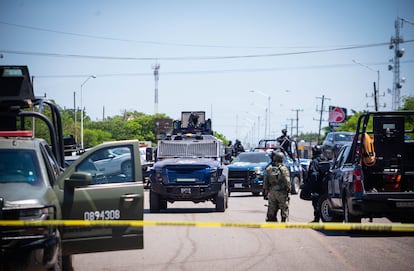Cartel war in Sinaloa spreads fear to other states in Mexico: ‘You see fewer people on the streets and businesses close early’
Violence between warring factions has had a direct impact on people’s lives. Many have lost their jobs, children are not going to school, and car theft and kidnappings have increased


The war between factions of the Sinaloa Cartel has spread to other northern border states in Mexico, where Los Chapitos, led by the sons of Joaquín “El Chapo” Guzmán, and those loyal to El Mayo Flaco, the son of arrested capo Ismael “El Mayo” Zambada, previously shared the business of smuggling synthetic drugs into the United States. The struggle between the groups has stirred up the country’s drug trafficking hornet’s nest and spread panic among the population, who fear new confrontations in the states of Sonora, Baja California, Chihuahua, and Durango. “You see fewer people on the streets and businesses close early,” says Eduardo López, a freelance journalist from Ciudad Obregon, in southern Sonora, near Sinaloa and one of the cities with the highest number of homicides in the country.
The confrontation between Los Chapitos and the faction that remains loyal to El Mayo has intensified since Zambada accused Joaquín Guzmán López of being behind his capture by U.S. authorities last July. Sinaloa has since been mired in a cartel war, in which more than 60 people have already been killed, according to official data. This conflict represents one of the biggest fractures within the Sinaloa Cartel in the last decade, and the fear is that the violence will spread to other parts of the country.
Specifically, Ciudad Obregón woke up Sunday to the sound of strong bursts of gunfire audible across the city. Fortunately, only one person was injured. with a wound to the arm. “It is unclear if these were clashes between opposing groups or if it was a group that wanted to send a message that something worse was coming later,” says Sonoran journalist Juan Carlos Zúñiga. The Misión Sol, Cajeme, and Prados del Tepeyac neighborhoods experienced extreme tension. It was the first high-impact event to occur after the war unleashed in Sinaloa. “It took place near parks and near public spaces. People had to throw themselves to the ground and tried to flee,” adds Zúñiga.
“Violence, to encompass everything that happens here, began to increase in 2012, but until last year there had been targeted killings, with few consequences for the general population,” says López. “There were shootouts in at least seven different points in the city, both between police and hitmen, and between hitmen and hitmen, perhaps from rival groups,” he adds.
The State Attorney General’s Office arrested a person named Brandon ‘N’. The agents caught him while he was fleeing along the International Highway, with several weapons. However, the authorities have denied that what happened has any relation to the violence in Sinaloa. “It is not very clear, to be honest. Otherwise, violent events continue to occur in the State. Since what happened in Culiacán, the intensity of violence in Sonora has not decreased or increased, except for what happened yesterday in Obregón,” says Zúñiga.
The journalist believes that the events could have been a warning and an attempt to provoke fear among the population. A week earlier, the Mexico Attorney General’s Office (FGR) arrested 20 alleged members of the Sinaloa Cartel in Sonora. They were wearing vests with the legend La Plebada 74, one of the armed wings of Los Chapitos, and assault weapons, explosives, ammunition of different calibers and several vehicles were seized.
On September 20, 11 bodies were found in the municipality of Ojinaga, in the neighboring state of Chihuahua, a territory shared by both factions. The state prosecutor, César Jáuregui, has been quick to rule out that the wave of deaths are related to each other. But whatever the authorities in Chihuahua and Sonora say, violence has increased in several northern states and the country has again reached nearly 100 deaths a day, figures that seemed far removed from the present. The Chihuahua prosecutor has indicated that it is still too early to determine if the Sinaloa war is causing what is known as the “cockroach effect,” but he did not rule out that other organized crime groups are taking advantage of the conflict between Los Chapitos and El Mayo’s faction to take control of the territory.
Amid the clashes, the population tries to continue daily life. However, the panic becomes more palpable every day. Last Saturday Juan Carlos Sánchez Palacios, a lawyer, was killed by mistake during an army operation against organized crime. The authorities initially said that Sánchez Palacios was an armed civilian. His family and friends have demanded a public apology and vindicate the memory of the deceased, a family man and a much-loved businessman in Culiacán. The operation was launched to arrest Jorge Humberto Figueroa, alias “27″ or “La Perris,” head of security for Los Chapitos.
Fear and collective psychosis have had a strong effect on local residents. The violence has also had a direct impact on commerce, to the point that many businesses have been forced to close. Jobs have been lost, children have missed school days, and car theft and kidnappings are on the rise. “What is happening in Culiacán is not normal; there are shootings day and night, the economy has collapsed, many people have lost their jobs and the violence is out of control,” says a friend of Sánchez Palacios, who prefers to remain anonymous.
Part of this psychosis is that of the few people who dare to speak out, none want to give their name for fear of reprisals. Monica, a fictitious name, owner of a spa in Culiacán, says she only leaves the house “15% of the time” she used to. Since the violence broke out in the city on September 9, her six-year-old daughter has not left the house, nor has she returned to school, despite the fact that the authorities have reinforced the security presence to get children back into their classrooms.
The clashes have also spread to municipalities near Culiacán. “Before, you knew you had until 5:00 p.m. to go about your business, like a self-imposed curfew, but now there are constant gunshots,” says Monica. Several users have shared images on social media where loud gunshots can be heard. Monica says that she and her family and friends are suffering nervous breakdowns due to the situation. “We are very afraid because we don’t know when this violence will end,” she says.
Sign up for our weekly newsletter to get more English-language news coverage from EL PAÍS USA Edition
Tu suscripción se está usando en otro dispositivo
¿Quieres añadir otro usuario a tu suscripción?
Si continúas leyendo en este dispositivo, no se podrá leer en el otro.
FlechaTu suscripción se está usando en otro dispositivo y solo puedes acceder a EL PAÍS desde un dispositivo a la vez.
Si quieres compartir tu cuenta, cambia tu suscripción a la modalidad Premium, así podrás añadir otro usuario. Cada uno accederá con su propia cuenta de email, lo que os permitirá personalizar vuestra experiencia en EL PAÍS.
¿Tienes una suscripción de empresa? Accede aquí para contratar más cuentas.
En el caso de no saber quién está usando tu cuenta, te recomendamos cambiar tu contraseña aquí.
Si decides continuar compartiendo tu cuenta, este mensaje se mostrará en tu dispositivo y en el de la otra persona que está usando tu cuenta de forma indefinida, afectando a tu experiencia de lectura. Puedes consultar aquí los términos y condiciones de la suscripción digital.








































